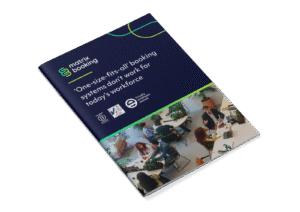
Why ‘one-size-fits-all’ booking systems don’t work for today’s workforce
The way we work has changed. Hybrid work schedules, shared workspaces and shifting employee habits have introduced greater flexibility, but also new complexity. The office is no longer a fixed destination where every desk is occupied from nine to five. Instead, it’s a mix of home, hubs and headquarters – consisting of different people in different places at different times.
However, this flexibility does not come without its challenges. Without the right hybrid work software in place to manage the workspace, teams can arrive to find overcrowded meeting rooms on peak days, or rows of empty desks midweek. The result? Hours lost to the simple task of finding a hot desk.
Yet many businesses are still relying on rigid, outdated office booking tools or room and resource booking software that were never designed for the realities of modern hybrid work. In fact, a quarter (25%) of hybrid organisations still use general office tools such as calendars and spreadsheets to manage their desk and meeting room booking needs.
From flexibility to frustration: the cost of outdated office booking tools
This reliance on unsuitable booking tools has real consequences. Our new research reveals that over a third (38%) of UK businesses lose up to a full day (24 hours) of operational time each week due to poor workspace management. As it stands, just over a quarter (28%) say that simply being unable to find available desks, or rooms in the office when needed is impacting productivity.
Currently, only 28% of businesses believe their current office booking tools fully meet their needs. It follows that 84% report experiencing challenges with these booking tools on a daily basis. These daily frustrations include:
- Overcrowded spaces on peak days (30%)
- Booking conflicts and double-bookings (27%)
- Lack of visibility into available desks and meeting rooms (23%)
These inefficiencies aren’t just inconvenient – they’re costly. Rising rents, utilities and upkeep make every empty office space and wasted hours harder to justify.
As a result, the appetite for change is clear. More than half (51%) of organisations are considering improvements or add-ons for their workspace management systems over the next 12 months, while a quarter plan to actively review or replace them. The top drivers behind this shift include:
- More efficient use of office space (39%)
- Improving productivity (37%)
- Boosting employee satisfaction and well-being (36%)
- Supporting hybrid working models (36%)
Looking ahead
As a result, the appetite for change is clear. More than half (51%) of organisations are considering improvements or add-ons for their workspace management systems over the next 12 months, while a quarter plan to actively review or replace them. The top drivers behind this shift include:
- More efficient use of office space (39%)
- Improving productivity (37%)
- Boosting employee satisfaction and well-being (36%)
- Supporting hybrid working models (36%)
Looking forward, organisations believe AI will become vital for future-ready workspace management and applications like maintenance and issue detection, real-time occupancy analytics and automated space booking. However, other features are considered even more critical than AI. For instance, organisations rank integration with calendars and collaboration tools (50%), user-friendly interfaces (50%) and flexible configuration for changing policies (45%) above AI as the most important features of a future-ready workspace system.
The Matrix booking difference
Today’s workplaces demand flexibility, not “one-size-fits-all” systems. To stay competitive and support a productive hybrid workforce, organisations need tools that adapt in real time.
Matrix Booking provides room and resource booking software, visitor management systems and occupancy sensor analytics into one solution. Employees get instant visibility of available spaces through smart scheduling, while anonymous sensors show how the office is truly used, eliminating wasted hours and tackling underutilisation.
For organisations, the benefits go deeper: seamless integrations with access controls and existing systems reduce IT complexity, provide clearer data, and simplify planning. And as needs shift – from new floor plans to evolving hybrid working policies – Matrix Booking adapts without disruption. To find out more, get in touch today.

Explore how else Matrix Booking can help you
Employees can search for desks in any of your buildings or shared hubs, find colleagues, make bookings for their team, and more.
People can find rooms that meet their needs, including location, facilities, capacity, and accessibility. Add equipment, catering, and other essentials.
Efficiently manage visitor sign in systems across your sites, ensuring a secure welcome and clear communication of health and safety procedures.
Powerful reports help you keep track of occupancy levels, usage trends, and more, so that you can continually optimise your estates.
Book your demo today
"*" indicates required fields
Matrix Booking uses the information provided to contact you about relevant content, products, and services. You may unsubscribe from these communications at any time. For more information, please read our Privacy Policy.



